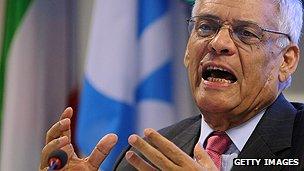Profile: Opec, club of oil producing states
- Published
What is Opec? In 60 seconds
Opec, the Organization of the Petroleum Exporting Countries, was set up in 1960 as an attempt by oil-producing states to assert themselves in a market dominated by the major multinational oil companies. It has expanded from its five founding countries to a membership of 12.
Opec member states currently produce about 40 per cent of the world's crude oil and 18 per cent of its natural gas. By its own reckoning, at the end of 2013, Opec states had proven oil reserves representing almost 81% of the world total, with the bulk of the reserves (66%) in the Middle East.
Opec has often faced difficulties in reconciling demands among its members to stabilise world prices on the one hand or use oil as a political lever on the other. Its influence has waned to an extent since the early 1980s, as importers have diversified their sources of petroleum.
Opec was founded at a meeting in Baghdad in September 1960, attended by Iran, Iraq, Kuwait, Saudi Arabia and Venezuela. They were later joined Qatar (1961), Indonesia (1962-2009), Libya (1962), the United Arab Emirates (1967), Algeria (1969), Nigeria (1971), Ecuador (1973), Angola (2007) and Gabon (1975-1994). Opec has been headquartered in Vienna since 1965.
Its stated aims are to coordinate members' policies in order to secure fair and stable prices for petroleum producers while ensuring a reliable supply to importers and a fair return on capital to those investing in the industry.
Price crises
The organisation rose to international prominence in the 1970s, as member-states increasingly took control of their domestic petroleum industries from foreign interests and acquired a major say in the pricing of crude oil on world markets.
Opec states were at the heart of two oil-price crises in the decade - the Arab oil embargo of countries that had supported Israel in the Yom Kippur War of 1973, and the fallout from the Iranian Revolution of 1979.
In this period Opec sought to trade an increase in prices for its product in return for a guarantee of supplies. Nonetheless, market imbalance characterised the relationship with consumers.
After an oil-price peak and subsequent steep decline in the early to mid-1980s, Opec and oil-importers began to cooperate on achieving market stability coupled with reasonable prices.
This strategy proved successful in countering a number of potential crises. By the end of the decade prices had recovered, and Opec members increased output following the US-led war with Iraq over Kuwait in 1991, in order to avert another dramatic increase in prices.
Prices remained relatively stable until 1998, when they fell sharply following the economic crisis in East Asia. Again, cooperation between Opec and some non-Opec producers eased recovery.
Founded: 1960
Resources: Member states produce about 45 per cent of the world's crude oil and 18 per cent of its natural gas. Opec's oil exports represent about 55 per cent of the crude oil traded internationally. At the end of 2010, Opec states had proven oil reserves representing 81.33% of the world total. (Opec website)
Structures: The Opec Conference formulates policy and is made up of delegations headed by the oil ministers of member states. It meets twice a year, in March and September, as well as in extraordinary sessions.
Headquarters: Opec Secretariat, Vienna, Austria
Secretary-General: Abdalla Salem El-Badri

Abdalla Salem El-Badri
The Secretary General is Opec's authorized representative and Chief Executive of its Secretariat.
As chief administrator of Opec he is answerable to the Board of Governors. The Opec Board appoints the Secretary General for a three-year term, renewable once.
The incumbent, Abdalla Salem El-Badri, is the representative of Libya, and took office on January 1 2007.
Challenges
Opec faces many challenges in the 21st century. Mergers between major multinational companies have strengthened their hand in relation to producer states, and government efforts to cut carbon emissions point to a reduction in oil demand over the long term.
In recent years, strong demand from developing economies such as China and India has kept production levels buoyant. However, in 2008 the world oil market faced considerable volatility, as prices hit record highs before slumping under the weight of the global financial crisis. The price slump came despite Opec's attempts to keep prices up by cutting production.
Within Opec itself there have been tensions between members. Countries with relatively small reserves and large populations, like Nigeria and Indonesia, have in the past lobbied for a rise in production in order to increase their earnings. Countries with relatively small populations and large reserves, like Kuwait and Saudi Arabia, have opposed this.
Indonesia announced in May 2008 that it would allow its membership to expire at the end of the year, on the grounds that it has become a net importer of oil, but industry analysts think tensions over production levels also played a part in the decision.
International political problems have not loomed as large as they did during the 1973 oil embargo on Israel's allies, but there were concerns that the European Union decision to halt importing oil from Opec-member Iran over its nuclear programme in 2012 could complicate life for the organisation.